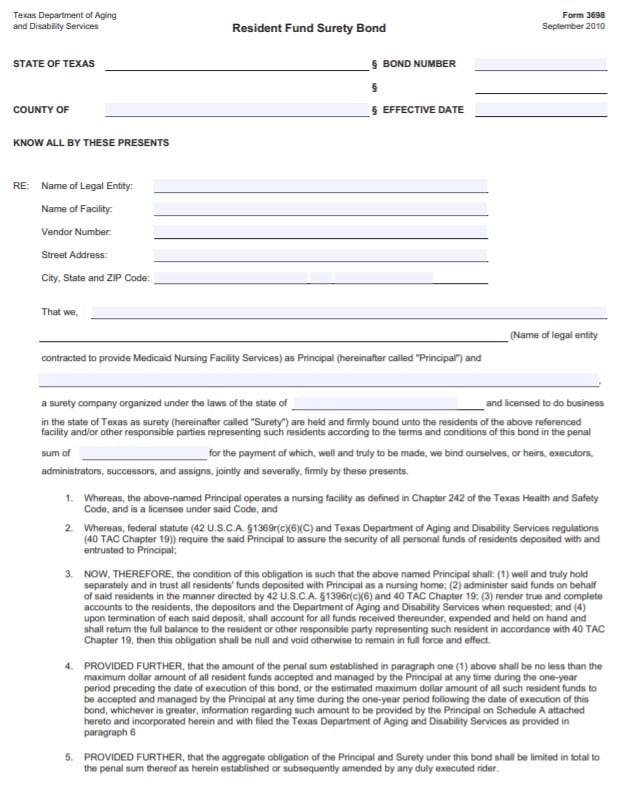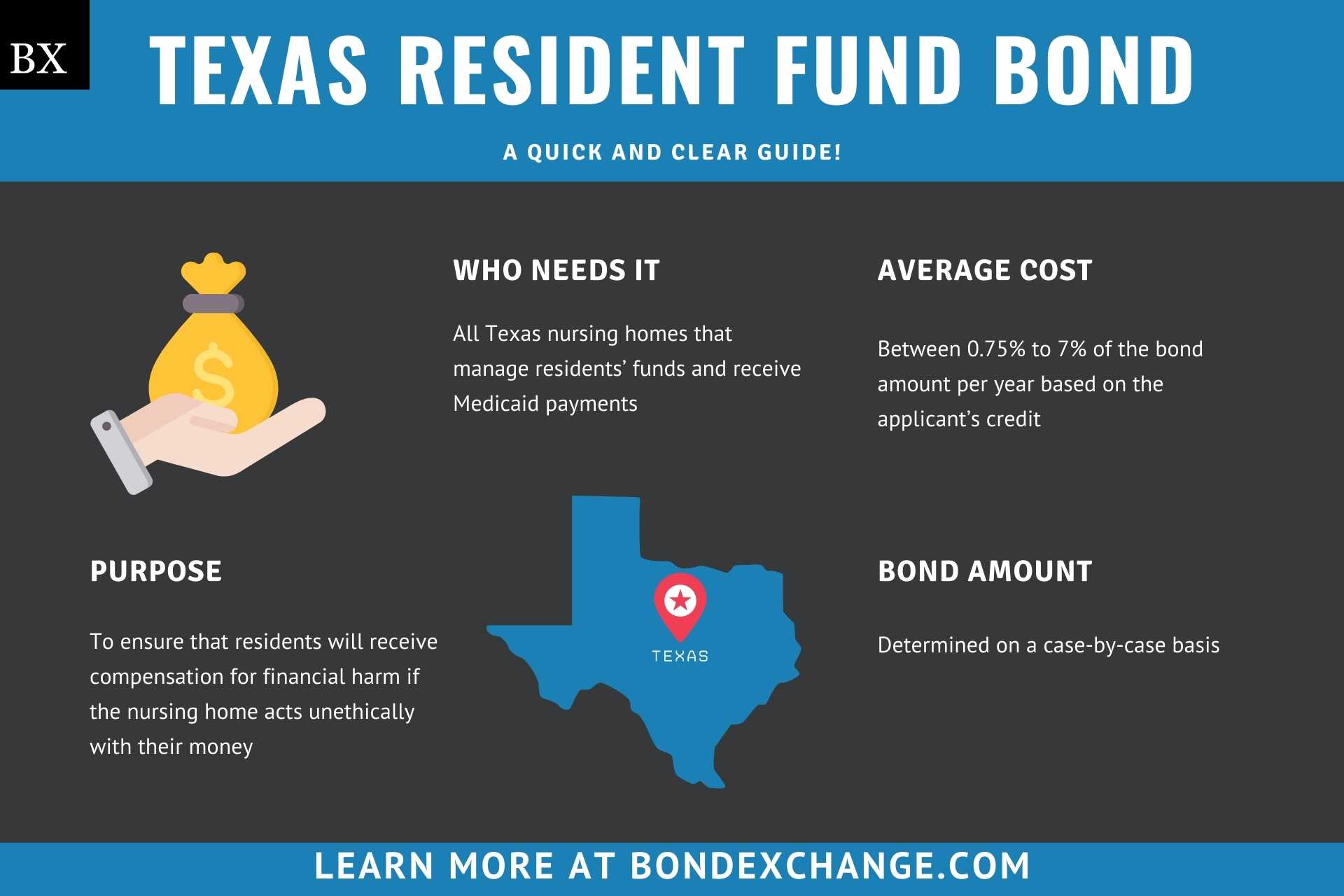Texas Resident Fund Bond: A Comprehensive Guide
This guide provides information for insurance agents to help their customers obtain a Texas Resident Fund bond
At a Glance:
- Lowest Cost: 0.75% of the bond amount per year, based on the applicant’s credit
- Bond Amount: Determined on a case-by-case basis (more on this later)
- Who Needs it: All Texas nursing homes that manage residents’ funds and receive Medicaid payments
- Purpose: To ensure that residents will receive compensation for financial harm if the nursing home acts unethically with their money
- Who Regulates Nursing Homes in Texas: The Texas Health and Human Services Commission

Background
Texas Administrative Code 554.2301 requires all nursing homes that receive Medicaid payments to obtain a certification with the Health and Human Services Commission. The Texas legislature enacted the certification requirement to ensure that eligible nursing homes receive compensation for services that are covered by Medicaid. To ensure residents are not taken advantage of, nursing homes that manage residents’ funds must purchase and maintain a surety bond to be eligible to receive Medicaid payments. Additionally, federal statute 483.10 requires all long-term care facilities that hold resident funds in a trust account to purchase a surety bond or other similar form of security. However, the federal regulation leaves the implementation and enforcement of this requirement to individual states.
What is the Purpose of the Texas Resident Fund Bond?
Texas requires nursing homes that manage resident funds to purchase a surety bond before becoming certified as Medicaid providers. The bond ensures that residents will receive compensation for financial harm if the nursing home fails to abide by the regulations outlined in Texas statute 554.405. Specifically, the bond protects residents if the nursing home in any way mismanages their funds. In short, the bond is a type of insurance that protects residents if the nursing home acts unethically with their money.
How Can an Insurance Agent Obtain a Texas Resident Fund Bond?
BondExchange makes obtaining a Texas Resident Fund bond easy. Simply log in to your account and use our keyword search to find the “nursing home” bond in our database. Don’t have a login? Gain access now and let us help you satisfy your customers’ needs. Our friendly underwriting staff is available by phone at (800) 438-1162, email, or chat from 7:30 AM to 7:00 PM EST to assist you.
At BondExchange, our 40 years of experience, leading technology, and access to markets ensures that we have the knowledge and resources to provide your clients with fast and friendly service whether obtaining quotes or issuing bonds.
Not an agent? Then let us pair you with one!
Click the above image to find a BX Agent near you
How is the Bond Amount Determined?
Texas statute 554.405 dictates that the limit on the Resident Fund bond must be equal to the average monthly balance of the facility’s resident trust fund account(s) in the 12 months leading up to the bond’s issuance or renewal. First-time applicants must estimate this average in the upcoming 12 months to determine their required bond amount.
Is a Credit Check Required for the Texas Resident Fund Bond?
Surety companies will run a credit check on the owners of the nursing home to determine eligibility and pricing for the Texas Resident Fund bond. Owners with excellent credit and work experience can expect to receive the best rates. Owners with poor credit may be declined by some surety companies or pay higher rates. The credit check is a “soft hit”, meaning that the credit check will not affect the owner’s credit.
How Much Does the Texas Resident Fund Bond Cost?
The Texas Resident Fund bond can cost anywhere between 0.75% to 7% of the bond amount per year. Insurance companies determine the rate based on several factors including your customer’s credit score and experience. BondExchange also offers monthly pay-as-you-go options for these bonds. The chart below offers a quick reference for the bond cost on a $20,000 bond requirement.
$20,000 Resident Fund Bond Cost
| Credit Score | Bond Cost (1 year) | Bond Cost (1 month) |
|---|---|---|
| 720+ | $150 | $15 |
| 625 – 719 | $200 | $20 |
| 600 – 624 | $500 | $50 |
| 575 – 599 | $600 | $60 |
| 550 – 574 | $1,000 | $100 |
| 500 – 549 | $1,400 | $140 |
*The credit score ranges do not include other factors that may result in a change to the annual premium offered to your customers, including but not limited to, years of experience and underlying credit factors contained within the business owner’s credit report.
Who is Required to Purchase the Texas Resident Fund Bond?
Texas requires all nursing homes that manage resident funds and accept Medicaid payments to purchase a surety bond before becoming certified as a Medicaid provider. To paraphrase Texas statute 554.101, a nursing home is an institution that provides 24-hour organized and structured nursing care to residents.

BondExchange now offers monthly pay-as-you-go subscriptions for surety bonds. Your customers are able to purchase their bonds on a monthly basis and cancel them anytime. Learn more here.
How Do Texas Nursing Homes Apply For a Medicaid Provider Certification?
Nursing homes in Texas must navigate several steps to secure their Medicaid provider certification. Below are the general guidelines, but applicants should refer to the application guidelines for details on the process.
Step 1 – Apply for a Business License
Nursing homes must obtain a business license through the Health and Human Services Commission to be eligible to receive a Medicaid provider certification. To obtain a business license, nursing homes must:
-
- Be registered and in good standing with the Comptroller of Public Accounts
- Be registered and in good standing with the Texas Secretary of State
- Pass an inspection conducted by the Office of the State Fire Marshall
After meeting the above criteria, nursing homes should submit their completed license application electronically here. Nursing homes must complete the application in its entirety, and submit the following items:
-
- Health authority letter (initial and change of ownership applicants only)
- National Provider Identification (NPI) number confirmation email
- Property documents (deed, lease, sublease, mortgage in lien of information)
- Management company agreement (if applicable)
- Ownership transfer affidavit (if applicable)
- Written letter announcing readiness for Life Safety Code inspection (initial applicant only)
- Written letter announcing that the facility has between 1 to 3 residents and is ready for health inspection
Nursing homes must pay the required application fee, which varies based on the type of license being applied for.
Step 2 – Pass Inspection
The Health and Human Services Commission will conduct a Life and Safety Code inspection of the nursing home after receiving their license application. The commission will examine whether or not the nursing home complies with all applicable standards and regulations when conducting the inspection.
License Period – All Texas Nursing Home Licenses are valid for three years and must be renewed before the expiration date
Step 3 – Purchase a Surety Bond
Nursing homes must purchase and maintain a surety bond in an amount equal to the average monthly balance of the facility’s resident trust fund account(s) in the 12 months leading up to the bond’s issuance or renewal. First-time applicants must estimate this average in the upcoming 12 months to determine their required bond amount.
Step 4 – Enroll as a Medicaid Provider
Nursing homes are eligible to enroll as Medicaid providers after obtaining their business license and passing the Life and Safety Code inspection. Nursing homes can complete their provider enrollment online here.
Nursing homes seeking to enroll as Medicare providers should complete the application located here, and submit the following items:
-
- Medicare Enrollment Application (must be mailed directly to the Medicare administrative contractor)
- Health insurance benefit agreement
- Two copies of proof of the facility’s IRS tax ID number
- Management company agreement (if applicable)
- Letter requesting a Medicare participation date
- Floor plan including all room numbers and the capacity of each room
- National Provider Identification Number (confirmation email)
- Letter indicating the fiscal year-end date
- Transfer agreement
- Civil Rights Clearance
Enrollment Period – Nursing homes must revalidate their provider enrollment at least once every 5 years
How do Texas Nursing Homes Renew Their License and Provider Enrollment?
Nursing homes in Texas must renew their state license every three years. All renewal applications can be submitted online here. Additionally, nursing homes must revalidate their Medicaid provider enrollment at least once every 5 years. The Health and Human Services Commission will contact the nursing home when it is time to revalidate their enrollment and provide them with instructions on how to complete the revalidation process.
What are the Insurance Requirements for Nursing Homes in Texas?
Texas does not require nursing homes to obtain any form of liability insurance as a prerequisite to obtaining a business license or enrolling as a Medicaid provider. Nursing homes that manage residents’ funds and receive Medicaid payments must purchase and maintain a surety bond.
How Do Texas Nursing Homes File Their Bond?
The obligee on the bond is the facility’s residents, so nursing homes most likely won’t need to file their bonds with any government agency. However, nursing homes will most likely need to Health and Human Services Commission with proof that they have obtained surety bond coverage. The surety bond requires signatures from both the surety company that issues the bond and from a representative of the nursing home. The surety company should include the following information on the bond form:
- Legal name, address, and vendor number of entity/individual(s) buying the bond
- Surety company’s name, address, and state of incorporation
- Bond amount
- Date the bond is signed
What Can Texas Nursing Homes Do to Avoid Claims Against Their Bonds?
To avoid claims on their bonds, nursing homes in Texas must ensure that they:
- Hold all resident funds in a designated trust account
- Administer all resident funds in a lawful manner
- Accurately report on all resident funds
- Refund all resident funds upon the termination of a deposit
What Other Insurance Products Can Agents Offer Nursing Homes in Texas?
Texas does not require nursing homes to purchase any form of liability insurance as a prerequisite to obtaining a business license or enrolling as a Medicaid provider. Bonds are our only business at BondExchange, so we do not issue any other types of insurance, but our agents often utilize brokers for this specific line of business. A list of brokers in this space can be found here.
How Can Insurance Agents Prospect for Texas Nursing Home Customers?
Texas conveniently provides a public database to search for active nursing homes in the state. The database can be accessed here. Contact BondExchange for additional marketing resources. Agents can also leverage our print-mail relationships for discounted mailing services.

